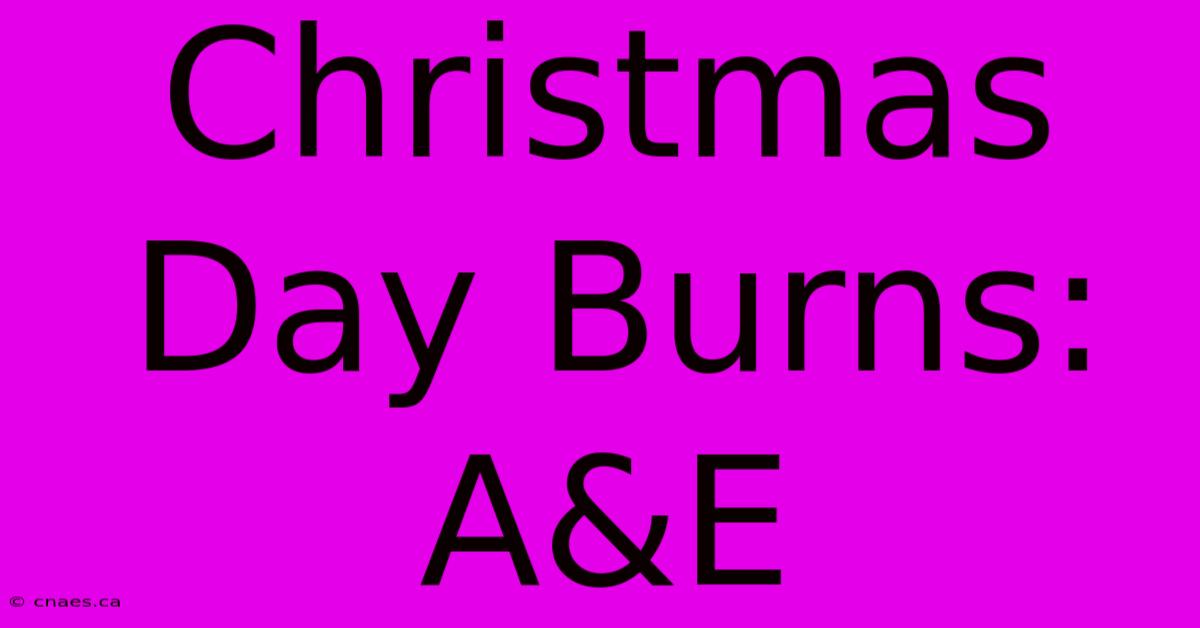Christmas Day Burns: A&E

Discover more detailed and exciting information on our website. Click the link below to start your adventure: Visit My Website. Don't miss out!
Table of Contents
Christmas Day Burns: A&E
Christmas, a time for joy, family, and festive cheer, can unfortunately also be a time for accidents. One of the most common emergencies seen in A&E departments on Christmas Day is burns, often resulting from cooking mishaps or festive decorations. This article explores the common causes of Christmas Day burns and offers advice on prevention and what to do in case of an emergency.
Common Causes of Christmas Day Burns
The festive season brings with it an increased risk of burns due to a variety of factors:
Cooking Catastrophes:
- Overcrowded Kitchens: Christmas cooking often involves multiple people simultaneously preparing various dishes, increasing the risk of collisions and accidental spills of hot liquids or oil.
- Distraction: The excitement and bustle of Christmas Day can lead to distractions while cooking, causing people to leave food unattended or forget about simmering pots on the stove.
- Increased Cooking Activity: The sheer volume of cooking increases the chances of an accident. More people cooking means more chances for mistakes.
- Unfamiliar Recipes/Equipment: Trying out new recipes or using unfamiliar cooking equipment can lead to unexpected mishaps.
Festive Decoration Dangers:
- Candles: The use of candles as part of Christmas decorations poses a significant fire hazard, especially in close proximity to flammable materials like Christmas trees or wrapping paper.
- Fairy Lights: Faulty or overloaded fairy lights can overheat and catch fire, causing severe burns.
- Open Fires: Traditional open fireplaces, while atmospheric, require careful supervision, particularly around children and pets.
Preventing Christmas Day Burns
Preventing burns is always better than treating them. Here are some crucial safety tips:
Kitchen Safety:
- Keep children away from cooking areas: Young children should be supervised carefully in the kitchen, kept away from hot surfaces, and taught about the dangers of heat.
- Use oven mitts and pot holders: Always use appropriate heat-resistant gloves when handling hot pots, pans, and dishes.
- Turn pot handles inward: This prevents accidental knocks and spills.
- Don't leave cooking unattended: Never leave food unattended on the stovetop or in the oven.
- Keep flammable materials away from cooking areas: Ensure that oven cloths, tea towels, and other flammable materials are kept a safe distance from heat sources.
Decoration Safety:
- Choose flameless candles: Opt for battery-operated candles to eliminate the risk of fire.
- Check fairy lights carefully: Inspect fairy lights for any signs of damage before use and avoid overloading sockets.
- Supervise open fires: Never leave an open fire unattended, and ensure that a fire guard is in place.
- Keep decorations away from heat sources: Avoid placing decorations near fireplaces, radiators, or other heat sources.
What to Do in Case of a Burn
If a burn does occur, swift and appropriate action can significantly reduce the severity of the injury.
- Cool the burn: Immediately run the burn under cool (not cold) running water for at least 20 minutes. Do not use ice or any greasy substances.
- Remove clothing: Gently remove any clothing or jewellery from the burned area, unless it's stuck to the skin.
- Cover the burn: Loosely cover the burn with a clean, sterile dressing.
- Seek medical attention: For serious burns, such as those involving deep tissue damage or covering a large area of the body, seek immediate medical attention.
A&E on Christmas Day: Be Prepared
A&E departments are often busier during peak holiday periods. Being prepared can help you navigate any potential emergency more effectively. If you suspect a serious burn, remember to:
- Call emergency services: Dial the appropriate emergency number for your location.
- Provide clear and concise information: Be ready to describe the nature of the burn and the individual's condition.
Christmas should be a time of happiness and celebration. By taking preventative measures and understanding how to react in an emergency, you can help ensure a safe and joyful holiday season for everyone. Remember, prevention is always the best medicine, but being prepared for the unexpected can make all the difference.

Thank you for visiting our website wich cover about Christmas Day Burns: A&E. We hope the information provided has been useful to you. Feel free to contact us if you have any questions or need further assistance. See you next time and dont miss to bookmark.
Also read the following articles
| Article Title | Date |
|---|---|
| American Airlines Flight Delays Weather And Tech Issues | Dec 25, 2024 |
| Willis Moore Daughter Announces Plans | Dec 25, 2024 |
| Gromits Hilarious New Adventure | Dec 25, 2024 |
| Chiefs Vs Steelers Nfl Christmas Schedule | Dec 25, 2024 |
| Messy Christmas A Miraculous Story | Dec 25, 2024 |
